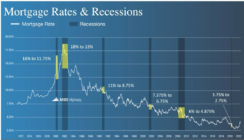
What Is a Refinance?
Refinancing means replacing your current home loan with a new one. Refinancing allows you to change the interest rate, loan balance or terms of your current mortgage. This is often done to save money.
There are two main kinds of refinances; both of which have financial value to homebuyers. The two types of refinances are a rate and term refinance and a cash-out refinance. JVM Lending can guide you through the process for either option!
Why Should I Refinance?
Under a rate and term refinance, you are exchanging your existing mortgage loan with another mortgage loan that offers either a lower interest rate or more favorable loan terms. A lower interest rate may be available for a variety of reasons – for example, maybe the market took a dip and rates are now lower than when you purchased, or maybe you originally had a 30-year loan and can now qualify for a 15-year loan (which is associated with lower interest rates). A different mortgage term involves switching loan products – for example, maybe your credit score improved significantly and you’d like to refinance from an FHA loan into a Conforming loan, to remove the monthly mortgage insurance payment that would otherwise be required throughout the life of the FHA loan.
Under a cash-out refinance, you as the homeowner are using the equity in your property to obtain a higher loan amount. The higher loan amount allocates cash to you as the borrower, which can be used for either major property repairs/remodeling or debt consolidation. It is important to note that cash-out refinances are usually associated with higher interest rates, so you may be sacrificing a lower rate for the extra cash.
Overall, a refinance is a great opportunity for many homeowners to lower their monthly mortgage payment, make improvements on their property, or consolidate debt.
5 Things to Know About Refinancing Your Home
For those looking to refinance, we recommend familiarizing yourself with the following 5 things:
How Does Your Credit Score Impact Your Refinance?
Your credit score is a number that lenders use to gauge how likely you are to repay your loans. It also influences the interest rate available to you. If your score is 760 or above, you’re in an excellent position and likely to get access to the most favorable interest rates out there.
It’s important to note that there can be variations between the credit score you find on platforms like Credit Karma and the one used by mortgage lenders during the refinancing process.
Why does this difference occur? Mortgage lenders look at three credit scores obtained from the major credit agencies: Experian, TransUnion, and Equifax. From these three scores, they use the median, or middle score, to evaluate your loan eligibility and the interest rates you’ll receive. Mortgage credit reports analyze your credit history differently than a standard credit report and, for this reason, the credit score used for qualifying you for a mortgage loan may be slightly lower than your consumer score.
We recommend reviewing your credit history carefully. Look for any errors on your credit report or areas that may need improvement. If you’re unsure, our team can assist you in this process. We can perform ‘soft’ or ‘hard’ credit checksto give you a clearer picture of where your credit stands.
Understanding Debt-to-Income Ratio in Refinancing
Your Debt-to-Income (DTI) ratio is a comparison between the money you earn each month (income) and the money you owe (debt). The maximum allowable DTI differs based on loan type. Our team can provide clarity on the DTI requirements for various loan programs and help you understand if refinancing is a smart move for you.
Understanding Refinancing Costs
Like a purchase transaction, refinance transactions also come with closing costs. The closing costs can be paid out of pocket by you, or you can pursue a “no-cost” refinance. A no-cost refinance is not free; it simply means that the lender will offer a credit (in exchange for a slightly higher interest rate) to cover all non-recurring closing costs for the transaction.
Non-recurring closing costs are those specific to the refinance transaction, including loan fees, title fees, appraisal fees, recording fees, etc. The borrower is still required to payclosing costs that would be incurred regardless of the refinance, including property taxes, homeowners insurance and pre-paid interest.
When discussing the potential costs associated with a refinance, your lender must prove that there is a tangible net benefit to you as the borrower for undergoing the refinance. During a “no-cost” refinance, your lender will ensure that you will be refinancing into a new loan with either a lower interest rate or lower principal & interest monthly payment. If you opt to pay your closing costs out of pocket, , your lender will conduct a cost-benefit analysis to ensure that you will recoup the upfront costs incurred to close the refinance with the monthly savings from the lower interest rate (within a reasonable period of time).
How Much Home Equity Do You Need To Refinance Your Home?
Your home equity is the value difference between your home’s current market value and your remaining mortgage balance. In simple terms, if your home is worth more than what you owe, you have equity.
For a rate and term refinance, in which you are lowering your interest rate or your principal balance, you only need a minimum of 3% equity for a low-balance, conforming loan.
For cash-out refinances, more equity is required. Here, you exchange your home’s equity for cash by taking on a larger loan. This extra cash can be used for home repairs or paying off debts. The amount of equity required for a cash-out refinance depends on the loan type and property type. For a standard, conforming loan, the maximum loan-to value is 80% for a 1-unit property.
When you refinance, an appraiser will estimate your home’s value and the value on the appraisal report will determine the equity you have in the property. To ensure an accurate appraisal, inform the appraiser and your lender about recent home improvements or upgrades, as these increase your home’s value.
Our team can guide you through the appraisal process and help you understand how much equity you need to successfully refinance your home.
How Long Does A Refinance Take?
Although similar to a purchase transaction in terms of the formal loan approval process, a refinance may take longer to close. On average, refinances can take 30-45 days.
Next Steps
If you are considering a refinance, we recommend using our refinance calculator to run some quick numbers and give you a feel for the different refinance rates available to you.
The best way to see whether a refinance makes sense for you is to have one of our mortgage experts at JVM Lending complete a free refinance analysis. We can help walk you through refinance scenarios, give you current interest rates, and discuss any other questions you might have.
If interested in a refinance, please reach out us at (855) 855-4491 or at [email protected].
























